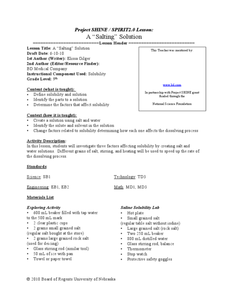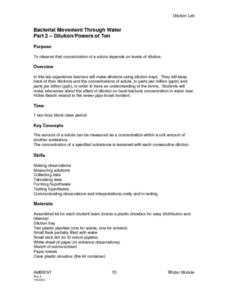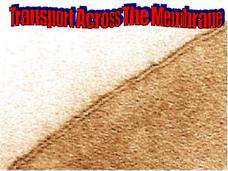Curated OER
Mixtures
Students observe that movement of a solute in the solvent increases the rate of dissolution. They demonstrate that when the solute is broken into smaller pieces it dissolves faster.
Curated OER
Tasty Solution
Students examine the difference between a solvent, solute and solution. In this solutions lesson students complete an experiment and observe what happens when a solution is stirred.
Curated OER
Chemical Solutions
For this chemical solutions worksheet, Students determine the significance of the critical point in a phase diagram and rank solutions from weakest to strongest solute-solvent interaction. This worksheet has 4 problems to solve.
Curated OER
Mixing in the Kitchen
Students identify the different types of mixtures. They identify examples of solutions, suspensions, colloidal dispersions, and emulsions through a game and basic experiments.
Curated OER
Dilutions Worksheet
In this dilution activity, students determine the final concentrations of solutions after a specific amount of water has been added. This activity has 4 problems to solve.
PhET
Beer's Law Lab
Beer's Law can be used to measure the concentration of certain compounds in samples of food. In the concentration simulation, particpants change and measure the concentration of different solutions by manipulating various types of...
Curated OER
A “Salting” Solution
Ninth graders investigate the factors affecting solubility. In this chemistry lesson, 9th graders differentiate solvent and solute. They give examples of real world application of solutions.
Curated OER
Solubility and Intermolecular Forces
In this solubility and intermolecular force learning exercise, high schoolers are given 26 clues about forces between molecules such as hydrogen bonds and London forces and about solubility of solutions.
Curated OER
Paper Chromatography
Students investigate the pigments in Magic Markers using chromatography. In this paper chromatography lesson plan, students use absorbent paper and mark the strip with a Magic Marker. They place the strip in a solvent and observe the...
Curated OER
Molarity Worksheet
For this molarity worksheet, students fill in unknowns such as mass of solute, moles of solute, volume of solution and molarity of solution in a chart with given solvents. They also calculate the molarity of solutions in other problems.
Curated OER
Chemistry
In this chemistry worksheet, students describe an atom, its parts, the charges of these parts, and atoms life functions. Then they explain what the octet rule states for the placements of electrons around the nucleus of an atom. Students...
Curated OER
Solubility
In this solubility worksheet, students determine which solute will be more soluble in the solvent listed. Students complete 7 matching and 3 problems to solve.
Curated OER
Solvents
In this solvents pre-lab worksheet, students describe the difference between a polar and non-polar solvent and also the dangers associated with hexanes and iodine. This worksheet has 12 short answer questions.
Florida International University
Are You Concentrating?
Explore the importance of a concentration gradient in the rates of dissolution. Using the ocean ecosystem, learners study rates of dissolution around coral reefs. A hands-on experiment helps individuals discover the effects of changing a...
Curated OER
Scavenger Hunt Worksheet
Exactly how environmentally friendly is your school? From the air fresheners in the bathrooms to the cleaning solvents used in the classrooms, young conservationists search the school grounds for sources of air pollution in...
Royal Society of Chemistry
State Symbols
When water is a solvent in a chemical equation, we consider it an aqueous solution. Scholars match the name of four states of matter to their proper symbol in a chemical equation. Four puzzles provide repetition to help pupils remember...
Curated OER
Bacterial Movement Through Water Part 2- Dilution/Powers of Ten
Students make dilutions using dulution trays. They keep track of their dilutions and the concentrations of solute, to parts per million (ppm) and parts per billion (ppb), in order to have an comprehension of the terms. Students make...
Gallantsbiocorner.com
Cell Membrane & Transport
Young scientists demonstrate their understanding of cell transport on this comprehensive activity. Focusing on cellular structure and the different processes that allow materials to move into, out of, and throughout animal cells, this is...
American Chemical Society
Does Temperature Affect Dissolving?
When making sweet tea, why do people dissolve the sugar in hot tea instead of cold tea? The class discusses the previous lab and builds upon it. Working in groups, they design an experiment to determine how temperature affects the...
Gallantsbiocorner.com
Transport Across the Membrane
Take your biology class on an exploration of the inner workings of cells with this multimedia presentation. Looking closely at the structure of cell membranes and the processes of osmosis and diffusion, this resource explains for...
CK-12 Foundation
Soap
Examine the chemistry of the laundry room! A thorough video explains the polarity and non-polarity properties of soap. The tutorial continues to explain the advantage of these properties in stain removal by showing the bonding of the...
Teach Engineering
Chromatography Lab
Groups use alcohol and chromatography paper to separate the color components of black ink. The purpose of the activity is to allow the class to become aware that mixtures exist in hidden places.
Curated OER
Osmosis
In this biology worksheet, students determine how many solvent and solute molecules there are in the red blood cell and the IV fluid. Then they determine whether the IV fluid is hypertonic, hypotonic, or isotonic to the red blood cell.
Curated OER
More on Temperature and Solubility
Learners discover how temperature effects the solubility of solutes by experimenting with a range of temperatures. They develop skills for observing, inferring, measuring, comparing and contrasting.

























